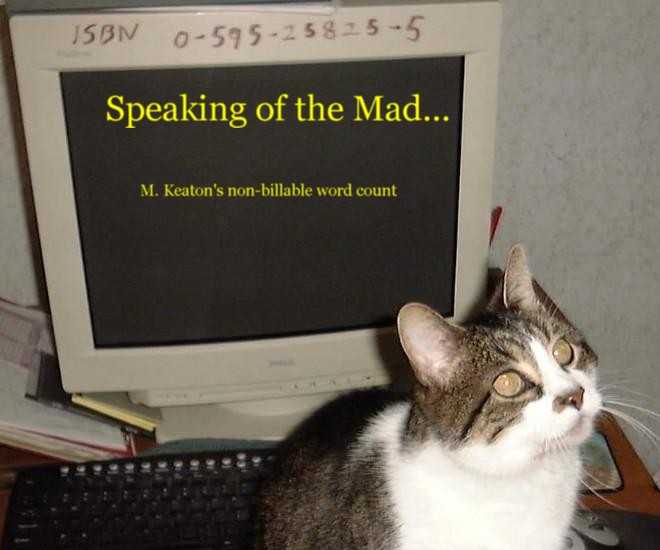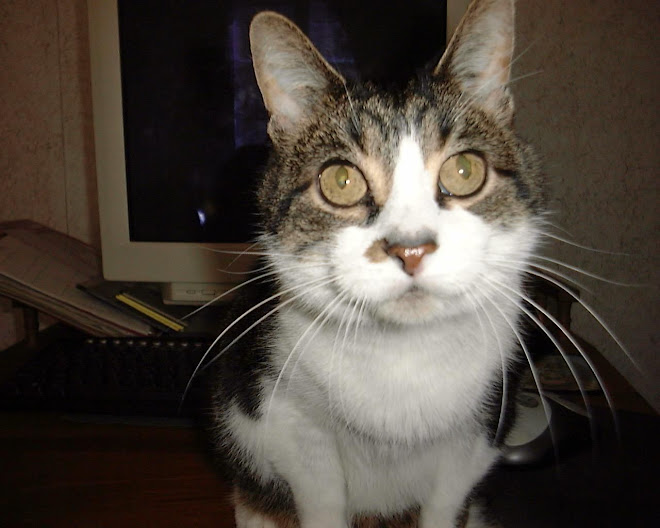[I originally was asked to write this for a book of essays by the "survivors of mental illness". It was rejected because it was "too depressing" and I refused to lighten it up. The truth, after all, is not chicken soup. I have debated about posting it for over a year now but, because of discussions and encounters with other authors, I finally decided it needed to be out there. In some ways, it may be considered a companion piece to the "Purple Crayon" essay.]
Depression is too kind a word, like you’ve had a bad day and things will get better with a hot meal and some sleep. The truth is a much darker thing--a crushing despair that saps your will and whispers in your ear that the world would be a better place without you, a sorrow so deep and pervasive that it literally makes your body ache, nights spent staring at the ceiling obsessing about the smallest of problems and drowning in a sea of fear, panic and anxiety pushing you under for the third time…no, depression seems too kind a word.
I tried to ignore it, to work through the fear and formless sense of loss. It’s just a character flaw, I would mutter through gritted teeth. Real men suck it up and deal. When my mind refused to acknowledge the growing truth, my body made the call. One morning shortly after Christmas, I rolled out of bed, headed for work, and found myself curled up on the floor, convulsing, crying, completely out of control, unable to even muster a coherent thought, afraid and overwhelmed by everything. I hit bottom full throttle, and years of ignoring the warning signs triggered a cascade of secondary problems that left me a proverbial basket case. Mental illnesses aren’t isolated conditions; they hunt in a pack. When I finally succumbed, my entire world, with my mind, came apart like a crushed eggshell.
I don’t remember the two years following my collapse, when a life-long struggle with depression and anxiety finally overwhelmed me. Somehow, my wife got me to a doctor and that doctor, in turn, realized I was beyond his ability to treat and found me a specialist able to begin chipping away at the problem. Body first, mind second. Months drugged into a near-zombie state while a devastated immune system and a glandular system, driven haywire by exhaustion and years of running in overdrive, healed.
In the gray mist, there are snatches of memory. My wife caring for me, running the household, and waiting for the return of the man she married with saint-like patience. Relatives bringing bags of groceries into the house. Friends visiting to sit in awkward silence. Finally, a change of medication, easing me back into reality, and the long, slow, painful task of rebuilding my mind and spirit, up from the bottom brick by brick.
No man is an island, and I benefited from the kindness of others more than I deserved. Twice I went back to my old job on reduced hours, the company owners firmly on my side, fighting to keep me on the insurance rolls. Twice, I spiraled into depression again, unable to stand up to the stress. Friends pulled strings to find me temporary weekend work that managed to make enough to pay for my medications. In the end, even that was not enough; and my doctor, a noble, caring man more dedicated to his Hippocratic Oath than his income, ignored his fee, supplied me with medication from his own stock of samples, and worked with the pharmaceutical companies to insure that I was never without the help I needed.
Years. It took years of pride and stubbornness to dig the hole; it took years to climb back out. Unable to work on a fixed schedule, often unable to even work with other people for an extended period of time, I returned to my first profession I had set aside to pursue a ‘career.’ I wrote--not great works, just simple escapist fiction for people who needed a break from the working world. I still wrestled with depression and fear every day, but I could function. The cost had been high but the next phase of my life had begun.
As part of my work as an author, I was encouraged to attend writing conventions, gatherings where authors, editors, and publishers mix freely with the readers who support them. I was hesitant. My emotional balance was still precarious; I was unsure how I would be able to handle myself in a public forum and afraid of being overwhelmed by the sheer press of humanity. In an odd kind of way, I found, among other authors and our readers, an extended family and support group. The number of authors and artists dealing with mental illness, and depression specifically, is disproportionately high compared to the average population.
I resolved from the first that I would not shy away from discussing my condition. I was not going to preach about it or even bring it up unless it was relevant, but neither was I going to sugar-coat the issue or apologize for being who I was and having, what I had finally been made to realize, was a legitimate medical problem. And the topic did come up, repeatedly; I was not alone in this. What made me a rarity was my willingness to speak. The social stigma against mental illness is still strong, and many of its sufferers live with the added burden of shame.
I had struggled for the better part of a decade with the question of why: Why me? Why this? I was about to receive my answer when I found myself in the hallway with an elderly lady, tears in her eyes, tapping me on the chest and sobbing. “You speak for us. Make them understand. You can make them see; we can’t. Don’t stop. You speak for us.” It was a humbling experience, to realize that for all my problems, I was so much better off than others, that I had found a way to stand with a foot in both worlds--healthy enough to function and speak publicly, but still fighting and unable to lose sight of the pain and intensity of the illness.
I am no activist. I don’t seek out soapboxes to talk about depression and mental illness and, in the grand scheme of things, I really don’t say that much. But I’m not backing down and I’ll not stay silent when the subject comes up. Why me? Because it’s not about me. It’s about us, the great sprawling “us” of depressive and bipolar and autistic and every other human being who labors under the public misunderstandings and shame of mental illness. If I can in my small way ease that pain, that’s a burden I’ll gladly shoulder.
My story is not completely one of hope or triumph, but neither is it finished. The depression is still there, an abyss always looming at the edge of my mind, held at bay by medication and the help of friends, family, and most especially a loving, attentive wife. Every day is a new struggle and every day is its own journey--some good, some closer to an emotional “Mister Toad’s Wild Ride.” I’m okay with that. I’ve made peace with who and what I am, the costs and the rewards. In the end, what more can anyone ask?
Wednesday, April 6, 2011
Subscribe to:
Comments (Atom)




















